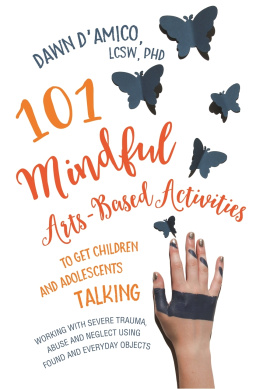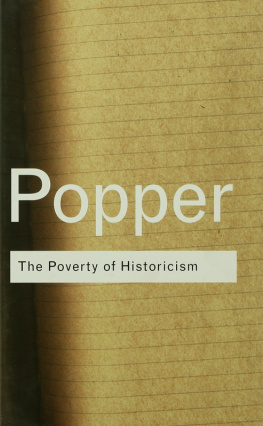ROUTLEDGE LIBRARY EDITIONS: HISTORIOGRAPHY
Volume 12
HISTORICISM AND KNOWLEDGE
HISTORICISM AND KNOWLEDGE
ROBERT DAMICO
First published in 1989 by Routledge
This edition first published in 2016
by Routledge
2 Park Square, Milton Park, Abingdon, Oxon OX14 4RN
and by Routledge
711 Third Avenue, New York, NY 10017
Routledge is an imprint of the Taylor & Francis Group, an informa business
1989 Routledge, Chapman & Hall, Inc.
All rights reserved. No part of this book may be reprinted or reproduced or utilised in any form or by any electronic, mechanical, or other means, now known or hereafter invented, including photocopying and recording, or in any information storage or retrieval system, without permission in writing from the publishers.
Trademark notice: Product or corporate names may be trademarks or registered trademarks, and are used only for identification and explanation without intent to infringe.
British Library Cataloguing in Publication Data
A catalogue record for this book is available from the British Library
ISBN: 978-1-138-99958-9 (Set)
ISBN: 978-1-315-63745-7 (Set) (ebk)
ISBN: 978-1-138-18886-0 (Volume 12) (hbk)
ISBN: 978-1-315-64201-7 (Volume 12) (ebk)
Publishers Note
The publisher has gone to great lengths to ensure the quality of this reprint but points out that some imperfections in the original copies may be apparent.
Disclaimer
The publisher has made every effort to trace copyright holders and would welcome correspondence from those they have been unable to trace.
H ISTORICISM
AND
KNOWLEDGE
ROBERT
DAMICO
First published in 1989 by
Routledge
an imprint of
Routledge, Chapman & Hall, Inc.
29 West 35th Street
New York, NY 10001
Published in Great Britain by
Routledge
11 Fetter Lane
London EC4P 4EE
1989 by Routledge, Chapman & Hall, Inc.
Printed in the United States of America
All rights reserved. No part of this book may be reprinted or reproduced or utilized in any form or by any electronic, mechanical or other means, now known or heareafter invented, including photocopying and recording, or in any information storage or retrieval system, without permission in writing from the publishers.
Library of Congress Cataloging in Publication Data
DAmico, Robert.
Historicism and knowledge / Robert DAmico
p. cm.
1. Knowledge, Theory ofHistory20th century. 2. Historicism History-20th century. 3 SciencePhilosophyHistory20th century. 3. SciencePhilosophyHistory20th century. 4. Popper, Karl Raimund, Sir, 1902- Contributions in theory of knowledge. I. Title.
BD161.D2719888820989
149dc 19
ISBN 0415900328
ISBN 0415900336 (pbk)
British Library Cataloguing in Publication Data
DAmico, Robert, 1947
Historicism and knowledge.
1. Philosophy Critical studies
I. Title
ISBN 0415900328
ISBN 0415900336 Pbk
Contents
Between the years 1970 and 1974 I had the rare opportunity to study with three remarkable and vastly different scholars. Sadly, and unexpectedly, the deaths of Marvin Farber, Mitchel Franklin, and Michel Foucault, in the past few years, have made my public appreciation for their direction and support belated. As one acutely aware of this works shortcomings, I can safely say that it is far better than it would have been because of an opportunity for unimpeded research provided by the National Endowment for the Humanities and a fortunate, if brief, period of study with Ian Hacking who influenced the early stages of this study, unbeknownst to him. I owe a special thanks to David Gross whose very careful reading of a version of this manuscript led to some necessary rewriting. I am especially thankful to the Institute for European and Cultural Studies at the University of Florida that has become my port in the storm, and especially to Alistair Duckworth, Robert Ray, Greg Ulmer, and Jack Zipes who have been unstinting in their personal and professional support. As a final sad note, our colleague from the Department of Mathematics, Robert Long, was murdered recently in one of those irrational, violent events that continually break the illusion of calm in modern society. He was a partner in many dialogues about this work, and much more, and I felt his absence as I tried to finish this manuscript.
On the personal side, Julie and Christopher sustained me during the past few years by not being crazy and by tolerating my perpetual state of distraction. This work, and a great deal more, would not have been possible but for Susan Armstrong; this one is for you.
In a recent article in The New York Times music reviewer Donal Henahan recounts an intellectual debate that raged across the pages of the British journal Music Analysis. The pretext of the debate between music theorist Allen Forte of Yale University and musicologist Richard Taruskin of University of California at Berkeley, was a technical question. Is Stravinskys The Rite of Spring a tonal or non-tonal piece? What might have appeared to be a simple empirical question became, as Henahan finds surprising, a complex theoretical dispute about such issues as the autonomy of intellectual objects and the methodology of the social sciences.
The two music scholars clashed over whether a musical composition should be studied as a part of some historical and cultural context, in which that piece would be reconstructed as the expression of those conditions, or as a specifically musical object, and as such subject only to specifically musical laws and conventions. Fortes method of formal analysis separates the musical object of study from the contingencies of historical context so as to carve out a level of musical abstraction one concerning physical properties of sound and harmony and conventional laws of music composition. A rigorous musical scholar, like a natural scientist, Forte suggests, ignores cultural and historical variation and concentrates on the formal structure of a musical piece.
Richard Taruskin replies that any attempt to abstract a composition from history, so as to treat only properties of sound and pitch, mistakes musical pieces, which are cultural objects, for natural objects. Taruskin accuses Forte of confusing the historically situated habits, routines, beliefs, and esthetic assumptions that make understanding cultural expressions possible with purely physical properties.
In reply to this attack Forte calls Taruskins view extreme historicism; a destructive relativism which reduces the study of music to a futile search for past purposes, motives, intentions and meanings. Taruskins position would leave musical scholarship with no accessible data and only speculation. If the study of music wants to progress and become scientific it must approach its object with phenomenological virginity, in Fortes words, making no assumptions beyond what is now present in experience. Forte dismisses as obsolete Taruskins distinction between natural objects and cultural expressions. Music, like any phenomena, is a natural process and Forte suggests that the social sciences must model the study of culture on the natural sciences. Music may be the easiest case since it responds wholly to natural laws over and above the contingent matter of what a particular society or culture takes as the meaning of that music.











